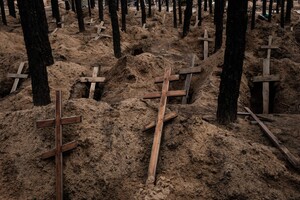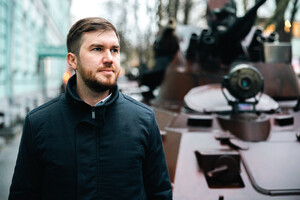How Ukraine is Advancing the Establishment of a Tribunal to Put Putin&Co on Trial
Ukraine and the world are approaching the sad anniversary of the full-scale invasion of the Russian Federation in February 2022. At the same time, we are also getting closer to the anniversary of the idea of establishing a special tribunal regarding the crime of aggression by the Russian and Belarusian leadership.
This idea originated and won the support of the Ukrainian authorities fairly quickly – already on March 4, Minister of Foreign Affairs Dmytro Kuleba took part in the Chatham House event, where the statement of Ukrainian and foreign lawyers and politicians regarding the need to create such a tribunal was presented.
Almost a year after the mentioned event, the idea of the tribunal is rapidly gaining new supporters. More and more states are joining the discussion, the conversation about the future tribunal is becoming more specific. So where is this complex process now, what are the views on the tribunal model, and what milestones will be key in the first half of this year?
Identification of the tribunal model
The first month of 2023 turned out to be extremely rich in events related to the tribunal. First, on January 19, the European Parliament adopted a resolution fully devoted to the issue of the establishment of a tribunal on the crime of Russian and Belarusian aggression. Subsequently, as many as three resolutions supporting this initiative were adopted at the winter session of the Parliamentary Assembly of the Council of Europe.
What do these important documents have in common? All of them are increasingly clear in outlining the vision of Ukraine’s partners on the tribunal’s model. While earlier there were hardly any preferences as to the methods of its establishment, now the European institutions explicitly support an international tribunal, ideally with the direct involvement or support of the United Nations.
The perfect scenario is a fully international tribunal
Swiss MP Damien Cottier, who drafted the key resolution for the tribunal at the PACE winter session, emphasized the importance of establishing a “fully international tribunal.” The question is not only about prestige or the abstract strength of supporting Ukraine.
It is international tribunals, as the International Court of Justice noted in the case between Belgium and the Democratic Republic of Congo, that can try leaders of states protected by official immunity, i.e., presidents, prime ministers, and foreign ministers. Hence, it is of paramount importance that the special tribunal, which is established primarily to prosecute the first persons of the aggressor state, has an international character.
The best way to achieve this is to establish a tribunal with the support or even under the auspices of the United Nations. The UN is the main international organization responsible for maintaining international peace and security. Therefore, its approval will ensure international nature of the tribunal. Although the Security Council will not pass a resolution on the establishment of such a tribunal due to Russia’s veto, the General Assembly, where Ukraine has already got important diplomatic victories since February 2022, will be able to provide appropriate support. On top of that, as the experience of establishing Extraordinary Chambers in the Courts of Cambodia shows, it can involve the Secretary General of the United Nations in the process.
The perfect option is the signing of an agreement between Ukraine and the UN on the setting up of an international tribunal open to accession by all states of the world. Later, Ukraine will be able to hold regional summits, where our partners will collectively decide on acceding to the treaty. Such a tribunal would be considered to represent the will of the international community and therefore could put state leaders on trial.
The controversy of the idea of creating a hybrid court
Despite the fact that the completely international nature of the tribunal has gained wide support from the European Parliament and the Parliamentary Assembly of the Council of Europe, in January we also heard an alternative suggestion. German Foreign Minister Annalena Baerbock, first in Kharkiv and then in The Hague, stated the need to create a hybrid tribunal, “whose jurisdiction would arise from Ukrainian law.”
This idea carries certain risks. There are reservations about the mandate of such courts to try foreign heads of state because their nature is only partially international. In any case, if the hybrid tribunal can prevent official immunity from being applied, its jurisdiction should come primarily from a treaty with the UN, and not from Ukrainian law, as proposed by Germany. Only then it will be considered established under international law, allowing it to put foreign leaders on trial.
Moreover, the hybrid tribunal is problematic from the perspective of the Constitution of Ukraine. It is difficult to agree that the prohibition of “extraordinary and special courts” enshrined in Article 125 of the Constitution, applies to hybrid tribunals. In 2001, the Constitutional Court noted that this provision refers to national courts “created to replace ordinary courts that fail to properly follow procedures established by law.” However, there are more significant constitutional obstacles – in particular, only citizens of Ukraine may be judges in Ukraine. Therefore, foreign justices will not be able to be involved in the hybrid tribunal.
This, in turn, will appear before the world as limiting its own impartiality, reduce the importance of its activities and cap the number of states that will join it and recognize its jurisdiction.
Due to these shortcomings, the idea of the German side failed to gain wide support from partners. At the meeting of justice ministers of EU member states on January 27 in Stockholm, the majority of participants did not support the idea of creating a hybrid tribunal. Belgium, Latvia, and Luxembourg advocated a fully international court. Only France agreed with the Germans.
Therefore, for the full implementation of the initial plan, it is crucial for Ukraine to defend the fully international format of the tribunal to be established within the framework of the agreement with the UN. This is the safest scenario that will ensure maximum support for the tribunal in the world. The role of regional organizations, such as the European Union and the Council of Europe, will be to ensure the accession of their members to the tribunal.
Further steps
Despite the progress made in promoting the idea of the tribunal, there is still much work to be done. Ukraine has already begun to formalize support by creating a “legal Rammstein” — the Core Group on establishment of the Special Tribunal for the Crime of Aggression against Ukraine. Its first meeting took place on January 26 in Prague, bringing together representatives of 20 states.
Undoubtedly, the Ukrainian side will mention the topic of the establishment of a special tribunal at the Ukraine-EU summit to take place on Friday, February 3, in Kyiv.
Intensive work is being done on the adoption of a resolution of the General Assembly — a key step on the way to the establishment of a tribunal capable of bringing the leadership of the aggressor state to justice. Presumably, such a decision may be adopted in February – on the symbolic dates of the anniversary of the full-scale aggression against Ukraine.
The tribunal will also be one of the leading topics at the summit of the presidents and prime ministers of the Council of Europe, which will be held on May 16–17 in Reykjavík. This will be only the fourth summit of heads of state and government in the history of the Council of Europe, so it is seen as a historic opportunity to demonstrate the effectiveness of the organization, in particular through effective steps in support of the establishment of the tribunal.
We should not forget about the conference of justice ministers on war crimes, which Great Britain and the Netherlands are organizing in London this March. Although it will focus on the work of the International Criminal Court, this meeting is a good platform for reconciling positions on the special tribunal.
In the end, the statement of US Under Secretary of State Victoria Nuland at the hearing of the Senate Committee on Foreign Relations on January 26 is important. She expressed hope that Ukraine, the United States and other G7 members will reach an agreement and be able to create a mechanism to prosecute the crime of aggression against Ukraine by this summer.
Thus, 2023 will be a key year not only for the victory of Ukraine, but also for the fate of the establishment of an international tribunal on the crime of aggression. Having ensured sufficiently broad support, we must turn it into tangible decisions and practical steps. Moreover, it is of great importance that the chosen model is not too compromising and corresponds to the primary goal – bringing to justice the perpetrators of the crime of aggression unleashed against Ukraine back in February 2014.
Read this article in russian and Ukrainian.
Please select it with the mouse and press Ctrl+Enter or Submit a bug

















 Login with Google
Login with Google